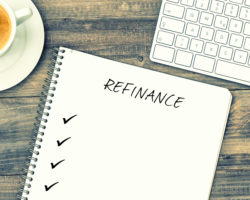Given today’s low interest rates, it’s really hard not to refinance. A new loan can provide you with lower monthly payments and can put some cash in your pocket. But what if you’re close to retirement? Is refinancing the right choice for you?
We’ve put together a list of pros and cons to help those of you who are nearing retirement better understand the risks and benefits of refinancing and to decide which course of action best suits your needs.
Pros
1. Refinancing can lower monthly payments
Saving money is the best and most common reason to refinance. If you still have many years on your loan, refinancing to a shorter-term loan can help you save money on interest costs. And the lower monthly payments will also give you a little more money each month that can be used for a variety of daily expenses such as vacations, home improvements and more.
2. Get rid of your mortgage faster
If you have a 30-year home loan, you can refinance it into a 15-year one. This might be a good idea if you intend to make larger payments in order to get rid of the debt faster.
3. You can consolidate your debt
Turning multiple loans into one single loan can make it easier for you to keep track of payments and it might also make more sense if you can get a lower interest rate.
4. You can choose a different type of loan
With today’s economy the way it is, it’s definitely not a good idea to leave anything to chance. So, if you have a variable rate loan, you can refinance it into a fixed rate loan. This can prove very helpful if rates are low but could rise in the future.
5. Put some much needed cash in your pocket
If you have equity in your house, a cash-out refinance lets you pull out capital for productive uses. You can use these funds for home improvements or to help pay for college for your children.
Cons
1. A new loan means a longer time to pay the loan back
People often rush to refinance their mortgages, only thinking about the lower payments that can result from it. However, if you have less than 15 years left on your loan and you refinance to a new 15-year mortgage, it will take longer for you to pay back the loan. Lower monthly payments might help put some more cash in your bank account, but don’t underestimate the sense of freedom that you, as a retiree, have when you don’t have to pay a mortgage anymore.
2. A new loan also means more money spent
Another disadvantage brought on by a new loan is the fact that you could actually end up spending more money than you have to. While the monthly payments may be lower, the life of the new loan is also longer, so the costs will be higher in the long run. You should use a mortgage refinance calculator to make sure that you’re not throwing money away.
3. It’s good to have a lot of equity in your home
Having a lot of equity in your home is never a bad thing, as it can come in handy when you’re faced with health issues and need to pay for long-term health care. Cashing out will leave you without this potential source of funds.
4. Payment penalties
If your original loan includes penalties for paying it off early, you could end up losing money, so you should always take into account the costs of any penalty when calculating the time it will take you to break even on the refi.
5. It will be harder for you to move
If you refinance your mortgage, you will have to stay in your home for at least a few years. Otherwise, if you decide to sell the house, you’ll end up losing money on the deal.










